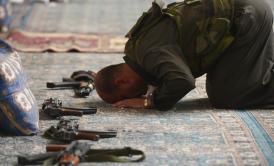U.S. involvement in Syria’s increasingly messy conflict just got messier.
A classified report uncovered by the New York Times reveals that many of the weapons sent to arm Syrian rebels in their fight to overthrow the Assad regime are ending up in the hands of hardline Islamic Jihadists.
The NYT with the analysis:
“That conclusion, of which President Obama and other senior officials are aware from classified assessments of the Syrian conflict that has now claimed more than 25,000 lives, casts into doubt whether the White House’s strategy of minimal and indirect intervention in the Syrian conflict is accomplishing its intended purpose of helping a democratic-minded opposition topple an oppressive government, or is instead sowing the seeds of future insurgencies hostile to the United States.”
Although the U.S. does not send arms directly to Syrian rebels, it provides intelligence and support for shipments of rifles and grenades mainly orchestrated by Saudi Arabia and Qatar. American officials have been trying to understand why hard-line Islamists have received such a large share of the arms shipped to the Syrian opposition. “The opposition groups that are receiving the most of the lethal aid are exactly the ones we don’t want to have it,” said one unidentified American official.
Part of the problem is the lack of organization and accountability in the underground weapons transfers, according to the report. There is no central clearinghouse for the shipments, and no effective way of vetting the groups that ultimately receive them. The report underscores serious concerns that not only could the weapons bolster anti-American insurgent groups, but these extremist groups could dominate a future Syrian government should President Bashar al-Assad be removed. “The longer this goes on, the more likely those groups will gain strength,” a Middle East diplomat told the Times.
